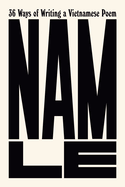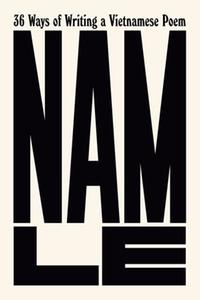
 In his fearless first poetry collection, 36 Ways of Writing a Vietnamese Poem, Nam Le, winner of the Dylan Thomas Prize for the short story collection The Boat, prioritizes language and voice to explore inherited wartime trauma and expose anti-Asian racism.
In his fearless first poetry collection, 36 Ways of Writing a Vietnamese Poem, Nam Le, winner of the Dylan Thomas Prize for the short story collection The Boat, prioritizes language and voice to explore inherited wartime trauma and expose anti-Asian racism.
Each poem is titled after a rhetorical strategy or analytical mode. For instance, "[3. Ekphrastic]" includes a photograph of the Vietnamese Australian writer's mother--"She in me in me." (He later reveals mẹ means mother in Vietnamese.) "[2. Invocative / Apostrophic]" also seems to be dedicated to a parent, one who has struggled to assimilate: "Your language your leash,/ My face my pedigree." Le by turns expresses alienation from his heritage--"What's Vietnamese in me/ Could fit in a poem"--and self-definition by it: "Whatever I write is/ Vietnamese."
Language and race are intertwined. "[1. Diasporic]," a bitter tirade against cultural imperialism, is one of several poems that imitate clichés of Asians speaking English to shame aggressors. "You dink I writee Yiknamee?/ Shame on You./ It was Your violence dumbed me./ Smeared me, reaved me--/ Your war I don't remember/ And won't let You forget." Language, too, can wreak or reflect violence. An erasure poem highlights the vulnerability of archives; in "[11. Violence: Anglo-linguistic]," English is portrayed as a killer language. Le contrasts English's strict grammar with Vietnamese's more open system: "Your grammar is violence. Your way is narrow/ Exaction." He also engages in M-led wordplay and compares the various meanings of "ma" and "me" in a tonal language.
This is a prophet's fervent truth-telling. There is no fawning gratitude for white generosity; instead, the speaker in "[24. Violence: Translative]" sarcastically remarks to a translator ignorant of Vietnamese: "So take it all / whatever./ Make your status out of their/ Sincerity." Le also calls attention to the hypersexualization of Asian girls and desexualization of Asian men.
Anaphora is one sonic technique used to emphasize the poet's points: a litany of "They'd rather you be..." reiterates anti-Asian stereotypes ("They'd rather you be inscrutable than difficult./ They'd rather you be impassive than original"), while "When they say..." phrases peel back layers of euphemism to uncover ugly facts: "When they say/ kill ratio they mean death -- our death."
There are actually 37 poems here--the final, sprawling one is full of glacial metaphors, alliteration, and a medley of rhyme types. Its vision of cosmic collapse and renewal is a broadening, perhaps a universalizing, of the personal material. High-concept and unapologetic, this collection pulsates. --Rebecca Foster, freelance reviewer, proofreader and blogger at Bookish Beck
Shelf Talker: Nam Le continues his examination of Vietnamese American history in a bold, intersectional debut poetry collection that traces the aftereffects of the Vietnam War.

